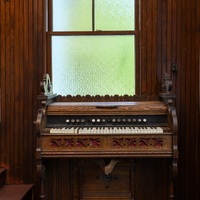Organ
Item
-
Title
-
Organ
-
Description
-
Pump organ, pre-1917. Made by the Cornish Company in Washington, NJ, which ended organ production in 1917. Organ was played at the First Baptist Church in Pennington and was similar to the one that provided music at Skillman Camp Meetings from the 1890s - 1930s.
-
Incorporated in February 1901 with $500,000 in capital, founders (J Bartles Cornish, State Senator Johnson Cornish, AS Florey) of the Cornish Company established music instruments manufacturing, principally pianos and organs in Washington, NJ (Press of Atlantic City 1901). In the early 1900s, the company claimed over 250,000 satisfied customers, with organ prices starting from $155.00 each (The Morris County Chronicle 1901). Throughout the company’s nearly 20 year existence, it contributed to the local economy by creating employment and participation in community social events. One year during the Warren County Farmer’s Association outdoor annual picnic the company featured an array of their finest instruments, with the CEO-Senator Cornish in attendance. During that same period it was noted that company sales had been sluggish; one person indicated that it was due to the war, WW1 (The Star-Ledger 1915).
The Cornish Company remained in family ownership weathering financial ups and downs, until succumbing to its demise. J. Bartles Cornish died in 1910 and was succeeded by his son Johnston Cornish whose death in 1920 was due to heart and kidney conditions. The son, a Presbyterian, was politically well connected, serving at different times as mayor, state senator, congressman and committeeman, as well as being the president of a local Washington bank (The Courier-News 1920). Timelines vary as to when he was active in company management. However, the company was placed in financial receivership in 1921, with complainant creditors lined up. The plant closed on June 1, 1922 and all remaining employees were dismissed (The Courier-News 1922). Shortly thereafter a court allowed the transfer of Cornish Company assets to new owners— bankers from Harrisburg, PA who downsized music instrument production to focus on furniture sales (The Courier-News 1922).
Mt. Zion African Methodist Episcopal Church, rebuilt in 1899 in Skillman, NJ, hosted annual camp meetings from the late 1800s until the 1930s, drawing Black and white attendees across the greater Sourland Mountain region (Buck and Mills 2018). Camp meetings represented a broader national tradition of relaxed Christian expression and faith renewal, especially among the Methodists. The Skillman Camp Meetings served as religious revivals, musicianship and social gatherings—with sermons, singing, food, and fellowship—held each summer in July and August, usually on Sundays. Showing the importance of camp meeting customs, in 2024 the Stoutsburg Sourland African American Museum celebrated the 125th anniversary of Mt. Zion AME by hosting a living-history reenactment of a 1899 camp meeting — complete with period dress, live music, oral histories, costumed interpreter and historic exhibits.
-
Cornish Company - Organ advertisement
-
Contributor
-
Stoutsburg Sourland African American Museum
-
Date Created
-
(c. 1900-1920)
-
Creator
-
Allen, Dallas Chester, descendant of the Smith and Blackwell families who were among the founding Black families of Pennington
-
Rights
-
This work is believed to be in the Public Domain under the laws of the United States. For more information, see http://rightsstatements.org/page/NoC-US/1.0/
-
Format
-
Physical Object
-
Extent
-
1 item
-
Spatial Coverage
-
Pennington, NJ
-
Publisher
-
SSAAM
-
Is Part Of
-
TBD by SSAAM
-
Subject
-
Organ (Musical instrument)
-
Faith
-
Religion
-
Piety
-
Joy--Religious aspects--Christianity
-
Spirituals (Songs)
-
Business enterprises
 Organ
Organ
